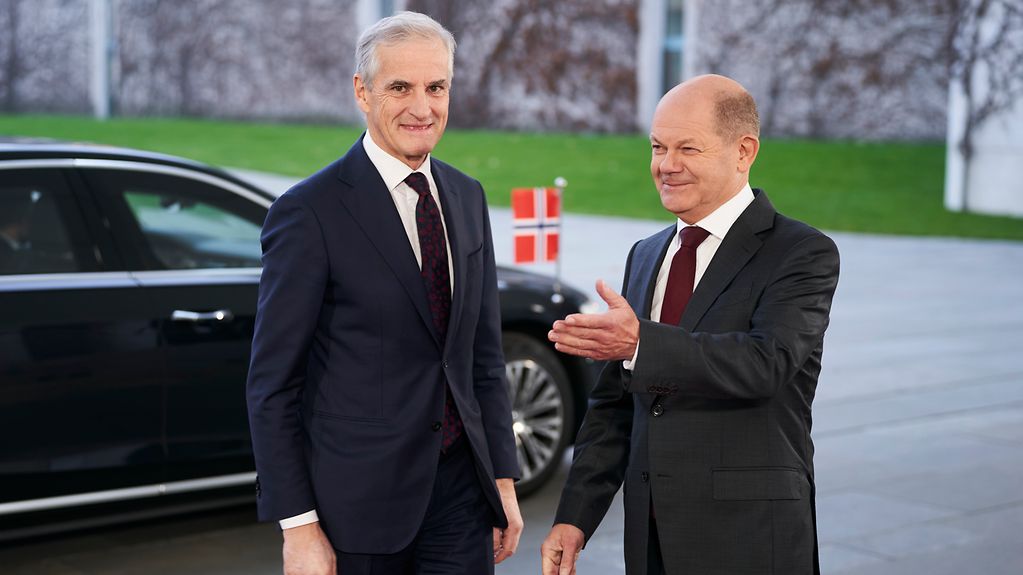Federal Chancellor Scholz receives Prime Minister Støre
Germany's situation would be much more difficult this winter without Norwegian energy supplies, said Federal Chancellor Scholz on Wednesday during Prime Minister Støre's visit to Berlin. As the attacks on pipelines have shown, he continued, it was necessary to collaborate on the protection of critical infrastructure.
3 min reading time

Federal Chancellor Scholz received Norwegian Prime Minister Støre in the Chancellery on Wednesday afternoon.
Photo: Federal Government/Schacht
"This is already our third face-to-face meeting this year; twice here in Berlin and once with you in Oslo, which is a clear indication of the close dialogue between Norway and Germany," said Federal Chancellor Olaf Scholz during Norwegian Prime Minister Jonas Gahr Støre's visit to the Chancellery in Berlin on Wednesday.
Jonas Gahr Støre has been the Prime Minister of the Kingdom of Norway (Minister of State) since October 2021.
A similar world view
Germany and Norway, said Scholz, shared common values and positions such as democracy, the rule of law, respect for human rights, and a belief in diplomacy and multilateralism. "In other words," the Federal Chancellor stressed, "we look at this world from a very similar perspective."
Closer together
The two countries had moved closer together in the face of the same challenges, Scholz said, referring in particular to Russia’s war of aggression against Ukraine and its far-reaching consequences, the climate crisis, and the increasing threat to the international order posed by certain authoritarian states, currently Russia in particular. "Norway is a very special partner for Germany," Scholz affirmed.
Norway is a reliable supplier
In many areas, such as climate, energy, and defence, he said, the collaboration was close and based on mutual trust. Federal Chancellor Scholz thanked Prime Minister Støre for this and referred to Norway as Germany's most important energy supplier.
The situation in Germany would be much more difficult this winter without the large and reliable supplies from Norway, Scholz stressed. "Our excellent and close collaboration means a lot to me, including on a very personal level."
Taking the heat out of energy prices
Not only was Norway Germany's most important partner for energy supply, he said, but also for the transformations in the energy sector that are needed to achieve climate neutrality. "Energy prices are high at the moment, extremely high, which is why Norway is also an important partner in Europe’s efforts to reduce prices. My hope is that the European Commission and Norway will develop some sound solutions in this area," Scholz continued.
Aligned in terms of security policy
Defence policy issues were also discussed. For example, he added, Norway and Germany have traditionally collaborated very closely on arms policy. "This is something we wish to continue," said the Federal Chancellor, whereby, he said, it was important for him to make clear "that close collaborations on armaments between allies is more than just a market-based process. I view it as a sign of our solidarity and mutual commitment to security," said Scholz.
Infrastructure: protect lifelines
The two heads of state also focused their attention on the protection of critical infrastructure on the seabed. "Pipelines, telephone cables, and internet connections are vital lifelines for our states and must be given special protection," Scholz emphasised. The relevant risks had been revealed not least by the attacks on the NordStream 1 and 2 pipelines, he said.
"That is why we took swift joint action following the attacks. Three German frigates went out on patrol in Norwegian waters and contributed to the reconnaissance of the situation," Scholz recalled.
Attacks are not without consequences
Going forward, he said, international approaches needed to be coordinated even more closely in order to incorporate the capabilities of the affected coastal states. Given its "tried and tested coordination capabilities, its maritime presence, and its expertise, NATO is very well suited to this task", the Chancellor noted.
The objective, he added, must be to rapidly achieve a proficient, permanent, and pragmatic international coordination of all relevant stakeholders for the protection of critical infrastructure, also with a view to being able to react quickly in an emergency. As Federal Chancellor Scholz explained, an agreement had been reached to ask the NATO Secretary General to establish a coordinating body for the protection of underwater infrastructure.
"By doing this, we also want to send a clear signal to the world, namely that we take the protection of our critical infrastructure extremely seriously and that no one should believe that attacks would remain without consequences," said Scholz.